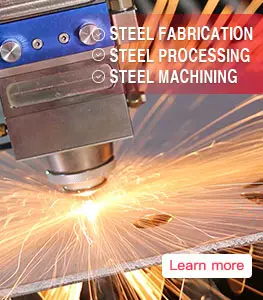Welcome to BBN Steel Materials Factory
What is ASTM A516 carbon steel?

ASTM A516 steel is a specification for carbon steel plates for moderate and lower-temperature service. The specification covers carbon steel plates intended for use in pressure vessels where improved notch toughness is important. The plates are available in four grades, each having different composition and mechanical properties. ASTM A516 is widely used in the oil and gas, petrochemical, and power plant industries.
Chemical Composition:
The chemical composition of ASTM A516 carbon steel depends on the grade and ranges from 0.24% to 0.31% carbon, with manganese ranging from 0.60% to 1.20%, and sulfur and phosphorus not exceeding 0.025%. Silicon, vanadium, and titanium may also be present in trace amounts.
Mechanical Properties:
ASTM A516 carbon steel plates are available in four grades: 55, 60, 65, and 70. The mechanical properties of each grade differ slightly, with changes in tensile strength, yield strength, and elongation.
A516 Grade 55 has a minimum yield strength of 30 ksi (205 MPa) and a minimum tensile strength of 55 ksi (380 MPa) with a maximum thickness of 2 in. (50 mm).
A516 Grade 60 has a minimum yield strength of 32 ksi (220 MPa) and a minimum tensile strength of 60 ksi (415 MPa) with a maximum thickness of 8 in. (200 mm).
A516 Grade 65 has a minimum yield strength of 35 ksi (240 MPa) and a minimum tensile strength of 65 ksi (450 MPa) with a maximum thickness of 8 in. (200 mm).
A516 Grade 70 has a minimum yield strength of 38 ksi (260 MPa) and a minimum tensile strength of 70 ksi (485 MPa) with a maximum thickness of 6 in. (150 mm).
Notch Toughness:
One of the key features of ASTM A516 carbon steel is its notch toughness, which is important for the performance of pressure vessels. Notch toughness measures the ability of the material to withstand the formation and propagation of cracks. This is particularly important in applications where the vessel is subject to sudden changes in temperature or pressure, or where there is a risk of the material being subjected to impact or fatigue loading.
The toughness of ASTM A516 carbon steel is improved through the addition of certain alloying elements, including silicon, nickel, and chromium, which improve the material's ability to resist cracking. The specification also includes requirements for Charpy V-notch impact testing, which measures the amount of energy absorbed by the material when it is subjected to impact loading. The results of these tests are used to evaluate the material's ability to resist brittle fracture and to determine its minimum impact energy requirements.
Applications:
ASTM A516 is widely used in the oil and gas, petrochemical, and power plant industries, where it is used to fabricate pressure vessels, boilers, and storage tanks. The material is also used in the construction of LNG (liquefied natural gas) tanks, chemical reactors, and heat exchangers.
In the oil and gas industry, the material is used to fabricate vessels and piping systems that are subject to high pressure and temperature, and that may be exposed to corrosive or abrasive environments. In the petrochemical industry, ASTM A516 carbon steel is used to fabricate reaction vessels, catalytic converters, and distillation columns, among other applications. In the power plant industry, the material is used to fabricate boilers, steam generators, and other components that are exposed to high temperature and pressure.
ASTM A516 standard boiler steel is a specification for carbon steel plates that are intended for use in pressure vessels where improved notch toughness is important. The specification includes four grades, each having different composition and mechanical properties. The material is widely used in the oil and gas, petrochemical, and power plant industries, where it is used to fabricate vessels, tanks, boilers, and other components that are subject to high pressure and temperature. The material's ability to withstand the formation and propagation of cracks is particularly important in applications where sudden changes in temperature or pressure are expected, or where there is a risk of the material being subjected to impact or fatigue loading.
.webp)
.webp)
.webp)
.webp)
.webp)
.webp)
.webp)
.webp)
.webp)



Leave a Message